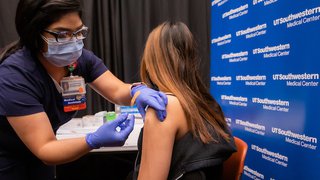
Everyone knows that smoking increases your chances of catching respiratory infections such as COVID-19. But new data show that vaping also escalates your risks – and young adults are getting hit the hardest.
Researchers at the Stanford University School of Medicine have published a study that showed teens and young adults who had used e-cigarettes were five to seven times more likely to be infected with COVID-19 than non-vapers.
Meanwhile, a study from the University of San Francisco found that smoking, including e-cigarettes, doubles young adults’ risk of getting seriously sick from the novel coronavirus.
The conundrum is that both vaping and COVID-19 are relatively new health risks that we're still learning about. And the concern is serious enough that some lawmakers have called on the FDA to temporarily ban e-cigarettes during the coronavirus pandemic.
The 2019 National Youth Tobacco Survey found that more than 5 million youth used e-cigarettes in the past 30 days, with nearly 1 million reporting daily use. As schools and colleges around the U.S. reopen, the potential for a spike in COVID-19 complications related to vaping is very real, particularly among many young people who have been socially isolated for months.
By and large, it’s never a good idea to put chemicals into our lungs. That's especially true with vaping, since we don’t always know exactly what the products contain. Experts have found carcinogens, heavy metals, and herbicides, among other nasty ingredients, in vape juice. And to top it off, manufacturers are constantly changing the formulations.
Your best bet is to educate yourself and the young people in your life on what we know about COVID-19 and vaping – and even better, take advantage of our virtual Nicotine Cessation Program.
What we know about vaping and COVID-19
It might be easy to dismiss COVID-19 symptoms such as coughing or shortness of breath as a symptom of vaping. However, young people should not shrug off these symptoms. As with traditional smoking, the long-term consequences of vaping likely will not be seen or felt for years. Ongoing research will tell us more about vaping and COVID-19 risk.
Here's what we know today:
- Studies suggest that vaping may weaken the immune system.
- Flavored tobacco products may reduce lung function, making COVID-19 exposure more likely to trigger an infection or exacerbate its symptoms. I hope to see more states take steps like California, where beginning Jan. 1, 2021, it will be illegal to sell most flavored tobacco products.
- The mist discharged from e-cigarettes could carry coronavirus-containing droplets into the air that can be re-inhaled or spread to others.
- Hand-to-mouth contact when using an e-cigarette increases transmission risk.
- Sharing e-cigarettes between friends also increases the risk of COVID-19 infection.
We've already seen respiratory health ramifications from vaping. In 2019, an outbreak of life-threatening lung illnesses – EVALI, e-cigarette or vaping product use-associated lung injury –sent parents and doctors on a mad dash for information to protect young patients.
For many people, COVID-19 is a mild illness. But not for everyone. There’s still a lot to learn about this novel coronavirus, including potential long-term effects such as heart and lung damage. This is just one more reason to talk with your teen about the dangers of vaping and how to quit if they have already started.
"Both vaping and COVID-19 are relatively new health risks we're still learning about, and the concern is serious enough that some lawmakers across the country have called for a temporary e-cigarette ban during the coronavirus pandemic."
David Balis, M.D.
Get (virtual) help to quit vaping or smoking
While some e-cigarettes claim to be nicotine free, CDC research has shown that 99% of e-cigarettes contain the highly addictive drug.
Some people can quit by going cold turkey. But most find that to be an unsuccessful technique. It takes courage and commitment to quit smoking or vaping. And often, a little outside help.
If you or a loved one is ready to quit, UT Southwestern's Nicotine Cessation Program provides all the tools you need to help kick the habit: counseling and, if necessary, medications to deal with craving and withdrawal. You can use this service from anywhere in the country through our virtual care program.
Tobacco use is at an all-time low among teens and young adults. We must not take a step backward and allow this generation of young adults to develop nicotine addictions from vaping.
Learn more about the Nicotine Cessation Program. To schedule a virtual visit, call 833-722-6237 or email us today.











